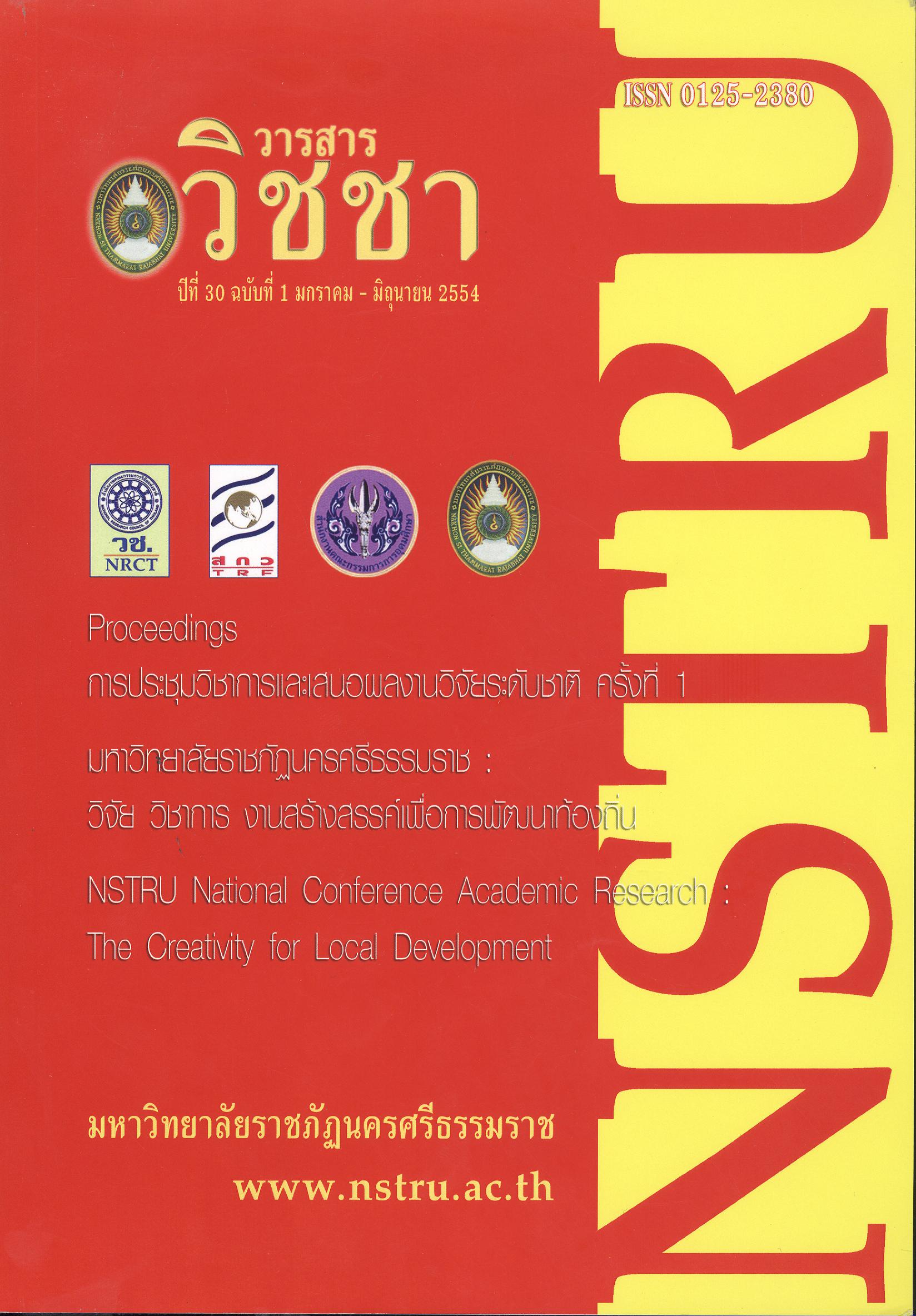รูปแบบการบริหารเชิงกลยุทธ์เพื่อการพัฒนาจริยธรรมนักเรียน กรณีศึกษา : โรงเรียนประถมศึกษาในจังหวัดนครศรีธรรมราช
Main Article Content
Abstract
1. ปัจจัยที่ส่งผลต่อความสำเร็จในการพัฒนาจริยธรรม คือ การสนับสนุนทางสังคมของนักเรียน ลักษณะมุ่งอนาคตและการควบคุมตนเอง การสนับสนุนทางสังคมของครู แรงจูงใจในการปฏิบัติงานของครู คุณภาพการสอนของครู พฤติกรรมของครู วิสัยทัศน์ของผู้บริหาร นโยบายในการพัฒนาจริยธรรมนักเรียน และบรรยากาศในโรงเรียน
2. กลยุทธ์การพัฒนาจริยธรรมนักเรียน
2.1 กลยุทธ์ด้านผู้เรียน คือ (1) พัฒนาจริยธรรมนักเรียนอย่างหลากหลายและต่อเนื่อง (2) ส่งเสริมการสร้างความสัมพันธ์อันดีระหว่างสมาชิกในครอบครัวของนักเรียน (3) เสริมสร้างแรงจูงใจใฝ่สัมฤทธิ์และมีลักษณะมุ่งอนาคตให้กับนักเรียน (4) พัฒนาระบบและกลไกการสนับสนุนทางสังคมให้กับผู้เรียน และ (5) การสร้างต้นแบบที่ดีเพื่อการพัฒนาจริยธรรมนักเรียน
2.2. กลยุทธ์ด้านกระบวนการ คือ (1) พัฒนาจริยธรรมนักเรียนบูรณาการกับการจัดการเรียนการสอน (2) ส่งเสริมกระบวนการมีส่วนร่วมของชุมชน (3) ส่งเสริมการสร้างความสัมพันธ์อันดีระหว่างครูกับครู ครูกับนักเรียน และครูกับผู้ปกครองนักเรียน (4) พัฒนาระบบและกลไกการกำกับ ติดตาม และสนับสนุนการดำเนินงานการพัฒนาจริยธรรมนักเรียน และ (5) พัฒนาระบบการดูแลนักเรียน
2.3 กลยุทธ์ด้านการเรียนรู้และพัฒนา คือ (1) ส่งเสริมและพัฒนาบุคลากรให้มีความสามารถในการพัฒนาจริยธรรมนักเรียน (2) พัฒนาระบบการจัดการความรู้ด้านการส่งเสริมและพัฒนาจริยธรรมนักเรียน และ(3) พัฒนาระบบข้อมูลสารสนเทศและส่งเสริมการใช้เทคโนโลยีในการบริหาร
2.4 กลยุทธ์ด้านงบประมาณและทรัพยากร คือ (1) ระดมทุนและทรัพยากรต่าง ๆ มาใช้ในการพัฒนาจริยธรรมนักเรียน (2) สร้างขวัญ กำลังใจ และแรงสนับสนุนทางสังคมแก่ครูและบุคลากรโรงเรียน (3) ส่งเสริมภูมิปัญญาท้องถิ่นและปราชญ์ชาวบ้านในการพัฒนาจริยธรรมนักเรียน และ (4)ใช้แหล่งเรียนรู้ในการพัฒนาคุณธรรม จริยธรรมนักเรียน
3. ผลการพัฒนาจริยธรรมนักเรียนโดยรวมนักเรียนมีพฤติกรรมเชิงจริยธรรมในระดับค่อนข้างสูง ถึงระดับสูง ระดับความพึงพอใจต่อผลการพัฒนาจริยธรรมนักเรียนโดยรวมอยู่ในระดับสูง ผลการประเมินโครงการตามแผนกลยุทธ์โดยรวมประสบความสำเร็จตามเป้าหมาย และพฤติกรรมเชิงจริยธรรมนักเรียนหลังการใช้แผนกลยุทธ์สูงกว่าก่อนใช้แผนกลยุทธ์ อย่างมีนัยสำคัญทางสถิติที่ระดับ .05
4. ผลการประเมินความเหมาะสมของรูปแบบการบริหารเชิงกลยุทธ์เพื่อการพัฒนาจริยธรรมนักเรียนโดยรวมอยู่ในระดับสูง
Strategic Management Model for Developing students’ ethics Cased Study : Elementary School in Nakhon Si Thammarat Province.
The purposes of this research were to develop the strategic management model for developing students’ ethics of Elementary School in Nakhon Si Thammarat Province. The research was conducted through 4 consecutive steps: Firstly, analyzing factors affected the success of developing students’ ethics. Secondly, developing the strategies for developing students’ ethics. Next, developing the strategic plan for developing students’ ethics. Finally, the develop strategic management model for developing students’ ethics. The instruments used in this study were 3 questionnaires, 3 field-notes, 2 evaluate notes and 1 report note. Data analysis was conducted using the SPSS for the Windows. Content analysis was analysed for Qualitative data.
The results of this study were as follows:
1. The factors of success in developing students’ ethics at student level were the students’ social supports, future-oriented aspect and self - control. When, Considering factors at teacher level, the teachers’ social supports, the teachers’ satisfaction to job action, the quality of teaching and teachers’ ethical behaviors. In term of factors at school level, the administrators’ vision and leadership, the policies and strategic plan in developing students’ ethical behaviors and school atmosphere.
2. There were 4 core strategies for developing students’ ethics as follows :
2.1 Student Strategies were (1) developing the students’ ethics as variously and continuely, (2) promoting the relation between members of student families, (3) supporting the achievement in motivation and students’ future-orienting (4) developing the system and mechanism of social supports for student. (5) the best model for developing students’ ethics.
2.2 Process strategies were (1) integrated the developing students’ ethics with learning management, (2) supporting the process collaboration of student’s parents, community and local area. (3) promoting to relationship between teachers and teacher, Teacher and student’s parents. (4) developing system and mechanism of supervising and supporting administration of developing students’ ethics. (5) developing cares’ student system
2.3 Learning and developing strategies were (1) promoting and developing ability of staff to train students’ ethics, (2) developing the knowledge management to promoting and developing students’ ethics, (3) developed the information system of school and promoting usability informational administration.
2.4 Financial and resource strategies were (1) mobilizing capital for usability to developing students’ ethics, (2) building up the inspiration and supporting the teachers and staffs of school, (3) promoting the local wisdom and local Experts for developing students’ ethics, (4) usability learning sources to developing students’ ethics.
3. The total results of developing students’ ethics concerning students’ behaviors were between rather high to high, The level of satisfaction to total results of developing students’ ethics were high. The total results of project evaluation according to follow strategic plan were successful in goals. The students’ ethic behaviors before using strategic plan were higher significantly at .05 than after using strategic plan.
4. The total appropriate evaluation of strategic management model for developing students’ ethics were high level.
Article Details
เนื้อหาและข้อมูลในบทความที่ลงตีพิมพ์ในวารสารวิชชา มหาวิทยาลัยราชภัฏนครศรีธรรมราช ถือเป็นข้อคิดเห็นและความรับผิดชอบของผู้เขียนบทความโดยตรง ซึ่งกองบรรณาธิการวารสารไม่จำเป็นต้องเห็นด้วยหรือร่วมรับผิดชอบใด ๆ
บทความ ข้อมูล เนื้อหา รูปภาพ ฯลฯ ที่ได้รับการตีพิมพ์ในวารสารวิชชา มหาวิทยาลัยราชภัฏนครศรีธรรมราช ถือเป็นลิขสิทธ์ของวารสารวิชชา มหาวิทยาลัยราชภัฏนครศรีธรรมราช หากบุคคลหรือหน่วยงานใดต้องการนำข้อมูลทั้งหมดหรือส่วนหนึ่งส่วนใดไปเผยแพร่ต่อหรือเพื่อการกระทำการใด ๆ จะต้องได้รับอนุญาตเป็นลายลักษณ์อักษรจากวารสารวิชชา มหาวิทยาลัยราชภัฏนครศรีธรรมราชก่อนเท่านั้น
The content and information in the article published in Wichcha journal Nakhon Si Thammarat Rajabhat University, It is the opinion and responsibility of the author of the article. The editorial journals do not need to agree. Or share any responsibility.


